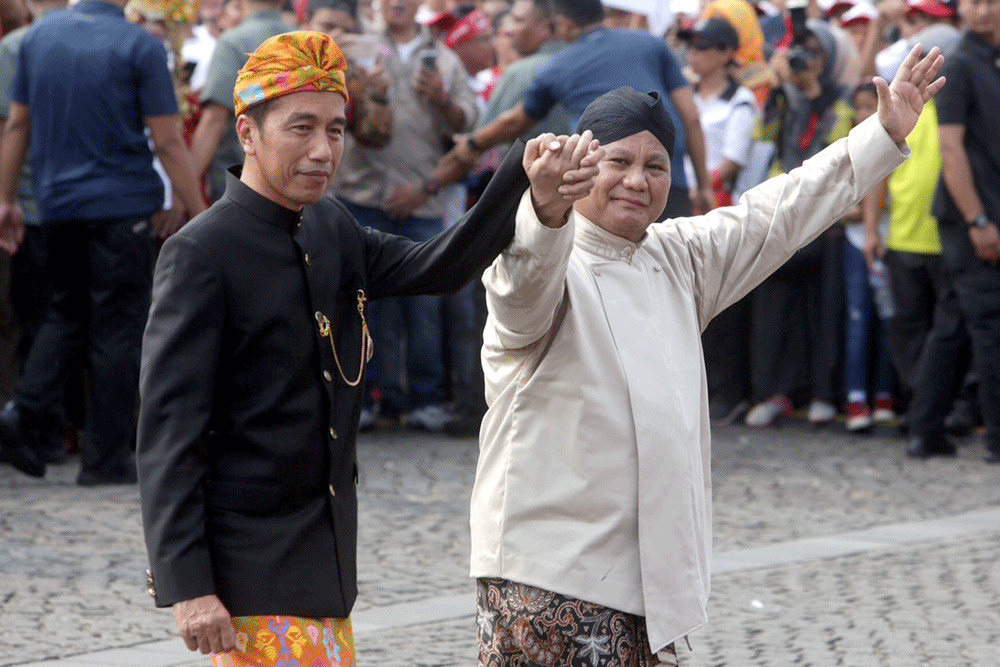Popular Reads
Top Results
Can't find what you're looking for?
View all search resultsPopular Reads
Top Results
Can't find what you're looking for?
View all search resultsDon't believe the hype
Beyond just targeting individual candidates, it now seems that hoaxes and fake news are being designed to attack the credibility of the election itself.
Change text size
Gift Premium Articles
to Anyone
 Clean campaign: President Joko “Jokowi” Widodo (left) and his challenger in this year’s presidential election, Prabowo Subianto, walk hand-in-hand during an event held in Jakarta on Sept. 23, 2018, in which they vowed to combat hoaxes and ethnic, religious, racial and ideological sentiments during the campaign period.
(The Jakarta Post/Wendra Ajistyatama )
Clean campaign: President Joko “Jokowi” Widodo (left) and his challenger in this year’s presidential election, Prabowo Subianto, walk hand-in-hand during an event held in Jakarta on Sept. 23, 2018, in which they vowed to combat hoaxes and ethnic, religious, racial and ideological sentiments during the campaign period.
(The Jakarta Post/Wendra Ajistyatama )
A
s in many other places that have experienced the frenzy of election season, Indonesia is not immune to the proliferation of hoaxes and fake news. With every political candidate and everyone above the age of 14 now holding megaphones in their hands, misinformation travels fast and wide. Even in places where democracy is established, like Brazil, the United Kingdom and the United States, hoaxes run rampant and have proven to sway election results.
Republican Donald Trump was elected US President on the back of a massive misinformation campaign allegedly orchestrated by Russians. It was also suspected that Russian online trolls were responsible for sending out pro-Brexit messages on Twitter in the days leading to the Brexit vote. In Brazil, the election of far-right candidate Jair Bolsonaro was preceded by the spread of thousands of lies through social media platforms like Facebook and WhatsApp.
Even before the announcement that incumbent President Joko “Jokowi” Widodo and Gerindra chairman Prabowo Subianto would again square off in a presidential election, hoaxes and fake news had proliferated at a massive scale. Until recently, most of the hoaxes were attacks and slander against individual candidates. The one hoax that keeps coming back is an unfounded rumor that Jokowi had links to the banned Indonesian Communist Party (PKI).
The disinformation campaign did not exclusively target Jokowi. It was also aimed at his election rivals. In August 2018, fake news circulated online that claimed that Prabowo’s vice-presidential candidate, Sandiaga Uno, said Indonesia would not find success at the Asian Games because “local athletes are physically weak”.
In recent days, the misinformation campaign has taken a sinister turn. Beyond just targeting individual candidates, it now seems that hoaxes and fake news are being designed to attack the credibility of the election itself. Last week, news broke that claimed seven containers of punched ballots were found at Tanjung Priok Port. It was alleged that, inside the containers, which were said to be shipped from China, were ballots that were cast for Jokowi and his running mate Ma’ruf Amin.
By some estimates, at least 17,000 tweets were made relaying the information. The General Elections Commission (KPU), aware of the potential fallout from the fake news, moved quickly by filing a report with the National Police, which later confirmed that the news was fabricated.
It is very likely that, in the lead-up to voting day in April, fake news will intensify. The most dangerous type of deliberate disinformation is the kind that seeks to delegitimize the entire election or sow doubts about the validity of the voting process.
Democracy rests on the assumption that the electoral process is free and fair. Once candidates and the electorate lose faith in the process, all bets are off.
With only three months left before the election, the KPU, the police and relevant authorities need to step up their efforts in curbing misinformation without trumping free speech. Voters, meanwhile, need to keep their common sense.
Indonesia’s democracy is too precious to fail.









